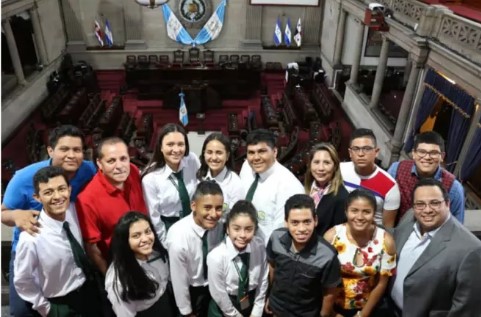Youth Participation in the Guatemalan Legislative Process: Perspectives from Critical Legal Theory
Keywords:
Law, Critical theory, Democracy, AdultcentrismAbstract
Youth participation in the Guatemalan legislative process, from a critical conceptual point of view, has as its central axis the production of knowledge. This is based on logical methods of deductive and inductive character. Conceptual tools of the hermeneutic method are synthesized, whose meaning is determined holistically with the synthetic method. It explores how the integration of young people in politics can transform and revitalize democracy in Guatemala. Key concepts of Jürgen Habermas, Michel Foucault and Giorgio Agamben are highlighted to contextualize and identify youth exclusion and the need for greater representativeness. They also highlight the institutionalization of adultcentrism in Guatemalan politics. They propose the incorporation of age subdistinctions to promote greater inclusion and social justice. It is emphasized that youth participation represents a challenge to existing power structures and is also crucial to build a more equitable and democratic society.
References
Agamben, G. (2003). Estado de excepción. Editorial Adriana Hidalgo.
Benente, M. (2015). Michel Foucault. Derecho y poder. Ediciones Didot.
Domínguez, H. (2013). Democracia deliberativa en Jürgen Habermas. Analecta política, 4(5), 301-326.
Foucault, M. (1976). Historia de la sexualidad, Volumen 1: La voluntad de saber. Siglo XXI Editores.
Foucault, M. (1983). Vigilar y castigar: nacimiento de la prisión. Siglo XXI.
Instituto Nacional de Estadística de Guatemala. (2018). Portal de resultados del Censo 2018. https://censo2018.ine.gob.gt/mapas
La Hora. (2024, 19 de marzo). El adultocentrismo estatal bloquea a las juventudes en el relevo generacional. La Hora. Recuperado de https://lahora.gt/opinion/ por-la-transparencia/2024/03/19/el-adultocentrismo-estatal-bloquea-a-las-juventudes-en-el-relevo-generacional/
Moreno Sainz-Ezquerra, Y. (2017). Judith Butler y la construcción del sujeto en términos performativos. Thémata, Revista de Filosofía, 56, 307-315.
Prado, G. (2021). Teoría del Estado (3a. reimp. de la 11a. ed.). Guatemala. Quintana, L., & Hermida, J. (2019). El método hermenéutico y la investigación en Ciencias Sociales. Aportes al Derecho, 3(3), 1-16.
Tobeñas, J. C. (1957). Los sistemas jurídicos contemporáneos del mundo occidental. Editorial Reus.
Weiss, E. (2006). Reflexiones de un pedagogo hermeneuta o sociólogo cultural en la construcción del objeto de estudio. En JD y LP (Eds.), La práctica de la investigación educativa I (pp. 11-25).

Downloads
Published
How to Cite
Issue
Section
License

This work is licensed under a Creative Commons Attribution 4.0 International License.
Authors who publish with this journal agree to the following terms:
- Authors retain copyright and grant the journal right of first publication with the work simultaneously licensed under a Creative Commons Attribution License 4.0 that allows others to share the work with an acknowledgement of the work's authorship and initial publication in this journal.
- Authors are able to enter into separate, additional contractual arrangements for the non-exclusive distribution of the journal's published version of the work (e.g., post it to an institutional repository or publish it in a book), with an acknowledgement of its initial publication in this journal.
- Authors are permitted and encouraged to post their work online (e.g., in institutional repositories or on their website) prior to and during the submission process, as it can lead to productive exchanges, as well as earlier and greater citation of published work.




